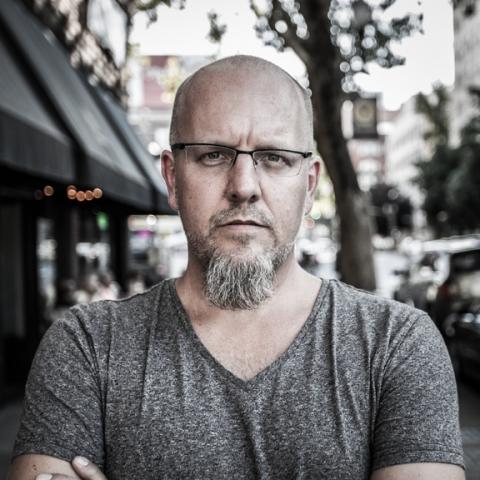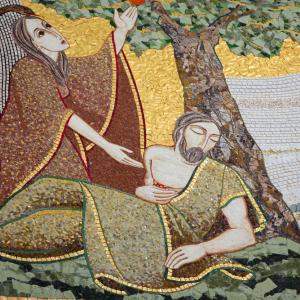
Christian Piatt is an author, blogger at Patheos and founder/cohost of the Homebrewed CultureCast podcast, where he focuses on the intersection of faith and popular culture. His latest book, “Leaving A-holiness Behind,” is available now, and his next book, “Surviving the Bible: A Devotional for the Church Year 2018,” will be available November 1, 2017.
Posts By This Author
Why We Don’t Trust Congress
We have reasons for our distrust. Congress seems more intent on partisanship and on campaigning than they are on acting as public servants. They advocate for a different health care system for the rest of us than they do for themselves. They fail to stick to campaign finance reform and they protect their own version of insider trading. All of this plays a role in our distrust. But there’s a deeper core issue at play.
Send Jesus to Guantánamo

Image via Mansoreh/Shutterstock.com
Poor people just don’t know what’s good for them. Freedom, after all, is only possible after order is established. If they can’t do for themselves what needs to be done, we’ll do what needs to be done anyway. Protect them from themselves.
As for the radical, his calls for “change” and a better way of life will fade after people are sufficiently fed, safe, and entertained. After all, who has the appetite for revolution when their bellies are already full?
They’ll thank us later.
Dear Christians: Don’t Skip Holy Week on the Way to Easter
I drove by a church last week, a few days before Palm Sunday, and read their sign: CHRIST HAS RISEN!
Um, no. No he hasn’t. In the Christian calendar he hasn’t even died yet. But this is an all-too-common phenomenon in Christian Churches.
Why?
Was the Tree of Knowledge the First Baptism?
When Adam and Eve eat from the Tree of Knowledge in the Garden of Eden, the deed actually is done, so to speak, before they take a bite of fruit. They both know better before they do the deed, but they do it anyway. But like baptism, eating the fruit is an outward expression of an inward choice. And although the law in our culture says that ignorance is no excuse, sin is a little bit different. The truly sinful act takes place when we know better but don’t do better.
And what happens then?
'Dad, Why Can’t We Just Kill The Bad Guys?'

Image via Peerayot/Shutterstock.com
For the first week of Advent, my wife Amy preached about hope. She pointed out that having hope doesn’t mean necessarily that we see a way out of suffering. It does, however, give us a reason to try to keep working through it. We have to believe there’s another side to it. Another possibility. The potential for a new reality.
And that reality will never, ever be realized by responding to violence with more violence. It may make us feel better in the moment. It may seem to offer short-term relief. But ultimately, it makes everyone that participates become a little bit of what they hate. And the cycle continues.
Which story will we choose to try to live into?
How I Went From Texas Baptist to LGBTQ Advocate

Image via Kichigin/Shutterstock
“I believe Jesus would. I don’t have any verse in scripture. … I believe Jesus would approve gay marriage, but that’s just my own personal belief. I think Jesus would encourage any love affair if it was honest and sincere and was not damaging to anyone else, and I don’t see that gay marriage damages anyone else…” —Jimmy Carter, from his interview with Huffington Post Live
I grew up in Texas as a churchgoing Baptist. I memorized Bible verses as part of my “sword drills,” went to church camp, took part in the clown ministry and even helped in the nursery.
Then I was kicked out at age seventeen for asking too many questions. My youth minister actually threw a Bible at my head and, in a less than nuanced way, invited me to move on, lest I contaminate the minds and hearts of my friends with my doubt.
Some of my questions had to do with their biblical interpretation, which was literal — and their assertion that the texts we were memorizing were the perfect, infallible Word of God, straight from the mind of the Divine to the paper on which it was written.
I had questions.
Why Tony Campolo 'Came Out' for Marriage Equality
After decades of “bridge building” between the LGBTQ community and those who identify as evangelicals in opposition to full LGBTQ inclusion, Tony Campolo spoke out in favor of both full inclusion of same-sex couples in the church, as well as for marriage equality.
“It has taken countless hours of prayer, study, conversation and emotional turmoil to bring me to the place where I am finally ready to call for the full acceptance of Christian gay couples into the Church,” he wrote on his blog on June 8.
Meet Caitlyn — Formerly Bruce — Jenner
The binaries simply don’t work, and when we try to cling to them we feel like the universe is crumbling around us when we see evidence to the contrary, and especially when we sense it within ourselves.
Welcome to the world, Caitlyn. You are beautiful.
It’s Time for Moneyball Church
Religion is notoriously behind on nearly every societal curve there’s ever been. Some say that’s a good thing, as it’s supposed to be countercultural.
But there’s a difference between pandering to cultural trends and being tone-deaf or willfully ignorant. And as one of my old grade-school counselors once said: when you know better, do better.
If we look around us we know that there are better ways to employ the resources we have to affect positive social change, deepen discipleship, and strengthen community of many kinds. But we adhere to mid-twentieth-century models and understandings of how the world works, then look around, asking ourselves why no one cares anymore.
It’s time for Moneyball church.
Why Comedians Can Be Prophets, Too
We tend to feel like we really know them when they share so much through their various media. Marc Maron got choked up and started to cry at the end of his interview with Terry Gross. And it felt real. I’m not saying it wasn’t real, but we know only as much as he wants us to know. He has created an artifice of authenticity in his work that feels real enough to us to suggest real intimacy, and this is what we lack so profoundly in today’s culture.
We’re too busy, too scared, too incapable, or maybe all of the above, simply to sit down and have “real conversations” with friends and loved ones like the ones Marc has on his shows. We find something wildly cathartic about the outrage Jon Stewart expresses about current events, and about the depths of apparent vulnerability Louis C.K. offers in his comedy routine and in his T.V. show, Louie. Amy Schumer takes the teeth out of human sexuality by helping us laugh at it, robbing it of some of its power.
Five Problems With Christian Evangelism (and What to Do Instead)
I got to thinking about evangelism this month in particular as part of My Jesus Project, a year-long practice I’m engaged in to more deeply understand what it really means to follow Jesus. This month I’m studying what I call “Jesus the Evangelist,” with Alan Chambers as my mentor. Chambers is best known as the founder and longtime head of Exodus International, an organization that emphasized conversion therapy, or helping people who were gay become — for lack of a better term — un-gay.
But it didn’t work. Chambers said so himself, as he is gay too, and he knows firsthand that he is still very much the same sexual being he was before. Further, the organization’s form of evangelism did a lot of damage, which he now seeks to repair.
Here are some all-too-common examples of how we misstep when trying in one way or another to share our faith with others.
How Fear and Ignorance Keep Working
How does this kind of mentality take hold of a state of nearly 30 million, at least to the point that the governor himself would take official action?
One word: fear. Actually two words: fear and ignorance.
Though it comes off as cartoonish and ridiculous to the typical onlooker, fear and ignorance are, in fact, powerful tools. And using fear based on a broadly shared perception — regardless of actual evidence — is something all too familiar to modern-day Christianity in the United States as well. And the reason it hangs around like heartburn after a double bean burrito is because it works.
Here’s how.
Why I, a Protestant, Pray the 'Hail Mary' and Use a Rosary
As part of this year-long effort to better understand what we mean when we talk about following Jesus, I’ve been making a more concerted effort to pray every day. Even though my tendency is to focus on silent, contemplative reflection, I’ve actually taken on a number of prayers that I do several times each, over a half-hour period or so.
Along with the Lord’s Prayer ("Our Father/God, who art in Heaven…"), the Jesus Prayer ("Jesus Christ, son of God, have mercy on me, a sinner"), the Serenity Prayer ("Lord, grant me the serenity to accept the things I cannot change…") and the Prayer of St. Francis ("Lord, make me an instrument of your peace…"), I also recite the Hail Mary. Not only that, but I use a rosary to go through my prayers.
I’ve shared this with some folks, and inevitably someone is surprised by this. I’ll get something like, “I didn’t know you’re Catholic.” Or, “Why pray to Mary? After all, she’s not actually God.”
Or is she?
Not that I think Mary personally was “God with skin on,” like we sometimes talk about Jesus. But like her son, I do tend to think that she pointed us toward God, which seems to be the one of the most important things Jesus did. In fact, when I’m asked what’s different about Jesus — as compared with other prophets and miracle workers in the Bible — I tend to respond that he, unlike others who preceded him in the biblical narrative, was more like the needle of a compass, pointing us in a common direction, rather than making himself the X marking the spot, the ultimate destination.
For me, Mary does this as well. There’s no story about her in the Gospels that suggests anything other than total devotion to God and to Jesus. In fact, in her conversation with God about becoming Jesus’ mother sounded much like Jesus prayer to God in the garden of Gethsemane, just before he was handed over to be crucified.
Both offered humble submission: Not my will, God, but yours be done.
Explaining 'Working Poor' to my Privileged, Middle Class Children
For my privileged, perhaps overly comfortable children, something as trivial as our Internet being down constitutes a crisis. When we do our “gratitude inventory” (aka, a way to get them to reflect and pray), they rattle off things as a matter of routine that many people would only dream of.
So how do I explain something as alien and complex a state as being part of the working poor in a way they can have a at least a chance to internalize?
This was part of my goal in taking on My Jesus Project, a year-long endeavor to more deeply understand what we mean when we talk about following Jesus: to move from ignorance to empathy, which can only be achieved sometimes through direct, personal experiences.
For a month, I was assigned by one of my “Jesus Mentors” to go out of my way to walk and/or take public transportation to get places, with the intention that I would come into contact with people I might otherwise miss or overlook. As I did it, I realized my kids could benefit from it as well.
The first sign that they needed such an experience was that when I announced to them we were taking the bus and train to do our family activities one weekend, they were excited. It was a new experience for them, rather than a necessity. As for the mile-long walks to get from place to place when the transit system didn’t get us exactly where we were going — they were a little less thrilled with that. And yet, we slowed down more, spent more time talking, and while on the public systems, I noticed we looked each other in the eye a lot more, rather than all facing forward (with the kinds inevitably with their faces fixed on a screen) in the car.
My son, Mattias, who is on the high end of the autism spectrum, is a keen observer, and I suppose a natural byproduct of that is that he asks questions. A lot of questions.
“Dad,” he said, after jumping off the final leg of the bus route one day, “why were some of the people sleeping on the bus?”
Five Things Christianity Can Learn From Buddhism
Could Christianity's future lie in Buddhism's past? This is a possibility that's been haunting me lately, but in a good way, I think.
One big critique, understandably, of postmodern views on Christian spirituality is that there's too much time and energy spent deconstructing old systems and ways of thinking that need to be torn down or reimagined, while lacking the same effort to build up something more helpful — more Christ-like — in its place.
This is true, and I'm as guilty of it as anyone. In my current spiritual practices as part of the current year I'm calling “My Jesus Project,” I'm trying to more fully understand what we mean when we talk about following Jesus. So it might seems strange to some that I would look to Buddhism for help in rebuilding my daily walk along the path of Christ.
Author and monastic Thich Nhat Hanh wrote a book years ago called Living Buddha, Living Christ, that had a profound impact on me. At the time, I was “A-B-C,” or “anything but Christian.” I had been thrown out of my church of origin for asking too many questions, and up to that point, I assumed there was no way I could ever associate myself with Jesus or the Gospel again. Thankfully — if surprisingly — it was a Buddhist monk who reintroduced me to Jesus.
In his book, he draws many parallels between the life, teaching, and practices of Jesus and those of Siddhartha Gautama, later known as The Buddha after achieving enlightenment. For Jesus, I imagine a similar experience of enlightenment coming to him during his monastic retreat into the desert. And as I seek my own moments of illumination during My Jesus Project, it occurs to me that Buddhism has much to teach us about where we might take Christianity in the 21st century.
No Ego
One of the greatest weaknesses of modern Christianity has been the focus on the individual. This comes more from our individualistic culture than from Christianity itself. Though we focus on personal (often translated as sexual) sin, the idea of sin within the Hebrew Bible was more corporate. There was more of an interdependent, tribal culture, and as such, so were the shortcomings. We've also focused too much on personal salvation or a “personal relationship with Jesus Christ,” which has also led to such bastardized interpretations as the false gospel of personal prosperity.
In Buddhist practices, one must learn to let the self die, in a manner of speaking, in order to create a deeper, more meaningful relationship and interdependence with others and the rest of creation. This is actually more consistent with ancient Jewish and Christian thought than our modern, egocentric version of Christianity.
Fifty Shades of God: Does Easter Week Affirm Our Violent Desires?
Have we made God into a monster? And as a result, have we taken the holiest of weeks in the Christian year and dressed it up as a celebration of bloody, violent sacrifice?
If so, I'm afraid we've gotten Easter all wrong.
I lead a small group discussion every Sunday morning at First Christian Church, Portland, where my wife, Amy, is the senior pastor. It's one of my favorite hours of the week, partly because of the common bonds of trust we're building that transcend our many differences. But it's also become a very safe place to ask hard, disturbing questions and to express ideas that, in many other contexts, might be shouted down or even excluded entirely from the conversation.
This week, we were discussing whether one could identify as Christian, in that they follow the example and teaching of Jesus, while also claiming no belief in any sort of metaphysical divinity (i.e., God). One member of the group, Heath, raised something very thought-provoking, particularly given the context of Holy Week and what it means to so many.
“If we are to believe that God sent Jesus to die for our sins,” said Heath, “it's easy to understand why so many would want to distance themselves from such a monstrous God.”
That led to a lively discussion about what Easter — and more specifically, Good Friday (when Jesus died by crucifixion) — meant to each of us, and how that understanding informed our understanding of the nature of God.
If God sent his only son first and foremost to die for our sins, then the climax of the Gospel narrative at Easter is the defining point at which we are left with what Heath called “Fifty Shades of God.”
Here we are left with what I call the conundrum of substitutionary atonement, which is the belief that Jesus took our place on the cross — deserved by us, not him — in order to satisfy the price someone had to pay for our sins. And although many who call themselves Christians claim this belief, it raises some hard questions we tend to overlook when embracing such a claim.
Why Having a Pop-Up Church for Good Friday Is Brilliant
My friend sent this link to me the other day, as it’s something we’re considering doing ourselves. The idea is simple, though would take some effort and a little courage to do well.
You get artists, singers, musicians willing to go out into the streets and share their music with anyone they meet, in a spirit of engagement, community, and purveyors of joyfully selfless and unexpected moments.
You go where the people are (sound familiar?).
You have a purpose (not to recruit people into your church; that’s selfish and not something I remember Jesus focusing on as much as being a healer and servant).
You give everyone you encounter an opportunity both to participate and to engage the cause.
This (below) is a pop-up church in a train station in the U.K. Personally I could have done without the giant crosses in the middle — but if nothing else, it helped share attention with the people involved, which should be part of the point. They’re inviting people into a sort of flash-mob singalong of “Lean on Me,” a spot-on choice for Good Friday in my universe. Then people are given a chance to drop a few coins, some food, or whatever they have to give into a donation space for a local book bank.
Love Is the Root of All Evil
Editor's Note: Christian Piatt was invited to preach at Portland First Christian Church on March 8. The biblical text was from Mark 11:15-19, in which Jesus cleanses the temple by driving out the moneychangers during passover from Herod’s temple. This is an adapted version of his remarks.
When I was a teenager, I wanted to be a rock star. I don’t have a way to project a picture of how I looked back in those days, but I’m sure if you ask, Amy would be more than happy to show one to you. She gets a good laugh about me with my blond hair, all the way down to the small of my back, my silk shirts and my little round John Lennon sunglasses.
Yeah, it may sound ridiculous now, but back then, I was kind of awesome. At least in my own mind, I was.
From the fifth grade on, I played the drums, at least until I figured out that girls didn’t pay a lot of attention to the drummer. So my sophomore year in high school I switched to singing and playing guitar. I was in different bands through college, worked for a few record companies, and had fun.
A LOT of fun.
But I was also kind of a mess. Rock star living is hard living, it turns out, even if you’re not actually famous. And being in bands is great, until you’re out of college and still working as a waiter at TGI Fridays so you can play gigs at night. In other words, I was going nowhere.
But more important, I wasn’t as happy as I thought I’d be. I mean I had fun, enjoyed myself most of the time, but I wasn’t actually happy.
I kind of put my musician days on a shelf until I met Amy, and she convinced me — not exactly kicking and screaming, but close — to go visit her church in Denver. I said I’d go once if she promised never to ask me again. She agreed, so I went. And it wasn’t as awful as I had expected. People were nice. They were good to each other. They were real, not just what they were told “Christians” were supposed to be. Plus they went out for beer afterward and I thought Amy was pretty hot, so I went back.
Ideology Over Humanity: The Problem With Criticizing Fred Craddock on His Funeral Day
One of the principal goals of My Jesus Project, a yearlong effort to better understand what we mean when we talk about following Jesus, is to practice and embody right-heartedness, or what I call “orthopathy.” I believe that, though our beliefs — orthodoxy — and our actions — orthopraxy — are important, both are anemically informed and out of balance in a Christ-like life if the so-called heart work doesn’t come first, to inform the other two.
Some of which I saw when reading prominent voices within the Southern Baptist Convention criticize Rev. Dr. Fred Craddock, known as one of the most influential voices in preaching in the past century, before his body was even in the ground. Craddock, who was 86 and had struggled with Parkinsons for a long time, died on March 7. He left behind a family, an extensive publishing library, and a nonprofit — The Craddock Center — that has done tremendous work for those trapped in poverty in Appalachia.
Two days after Craddock’s death, Jason Allen, president of Midwestern Baptist Theological Seminary in Kansas City, Mo., reduced in a blog post Craddock’s lifetime of preaching work to “a mild-mannered man encouraging mild-mannered people to be more mild-mannered” — on March 9, the day of Craddock’s funeral.
He also called Craddock’s essential claims to be “dead wrong,” claiming that it led to “no true preaching.”
Criticism of Craddock by members of the Southern Baptist Convention is not new. But there’s a big difference between lodging criticism a half dozen years before a man’s death and doing so the day of his funeral. Allen brazenly demonstrates one of the greatest dangers in what I have often called “valuing our ideology over others' humanity,” which dehumanizes and denigrates as a result.
This dehumanization does not play political or ideological favorites, either — any of us can fall prey to this trap when we hold our beliefs closer than our love of God, neighbor, and self.
I Think My Six-Year-Old Might Be Jesus
I’m not sure, but I think my daughter, Zoe, is Jesus. For a couple of reasons. But before I talk more about her, let’s talk about me. You know, since I’m not Jesus and I like talking about myself.
I hate failing. Really hate it, even when it’s partly out of my control. Just a few days I wrote about how, for My Jesus Project month in which I’m working on “Jesus the Ascetic,” I was fasting from solid foods, giving away half of my possessions, practicing a new spiritual discipline each week, and reading through the Gospel of Matthew with an ascetic perspective.
A couple of days later, my doctor and dietician pulled me off of my fast because seizure symptoms had re-emerged. I felt like I had failed, and it took me a day or two to muster the courage to even write about it. Yes, part of the practice was about listening to my body. Yes, another part was to learn to distinguish between my wants and needs. But I had pride at stake — as evidenced by the bruising of said pride when I had to change my diet.
So in a way, the pride at the root of my practice actually was the bigger shortfall. I’m still eating vegan all month, abstaining from alcohol and refined sugar, but I had set a goal and made a public statement about it, and I didn’t want to admit I couldn’t do it.
Further, my mentor for the month, Reba Riley, called me out — not so much for the shift in diet (well, a little bit), but mostly because of my motivations behind the overall My Jesus Project practice and my motivations. I was struggling, not just with the perceived failure and resulting embarrassment, but also with the fact that I was busting my ass in this practice — far more so than I’ve ever done for a previous book. Despite grandiose expectations (always the seeds of premeditated resentment), the traffic and overall public response has been pretty lukewarm.
“Why are you doing this?” she asked.
“It seems to me,” I said, “that we talk a lot about following Jesus, but most of us don’t put a lot of serious energy into figuring out what that really means, day to day, myself included. So I’m taking a year to try and figure it out. And I’m trying to do it in a way that invites other folks to figure it out along with me.”
“And you’re writing about it.”
“Yeah,” I said.
"Let me put it this way. If no one else was watching, if you were doing this only for yourself, would you still do it?” she said.
















